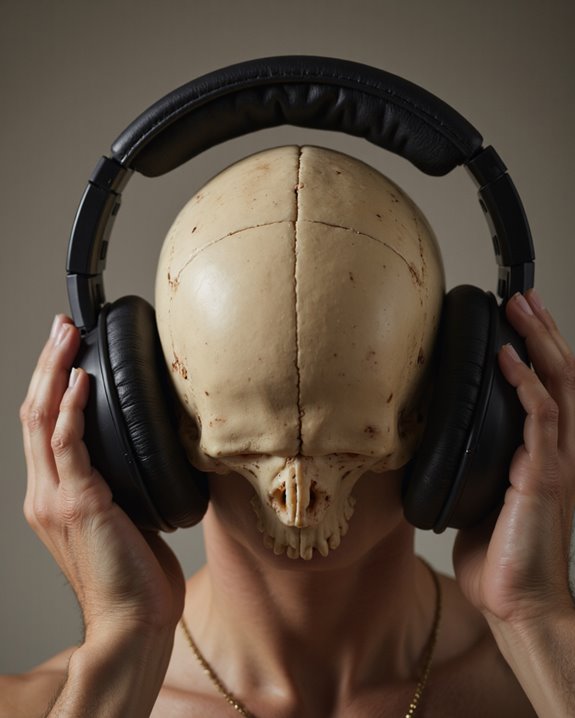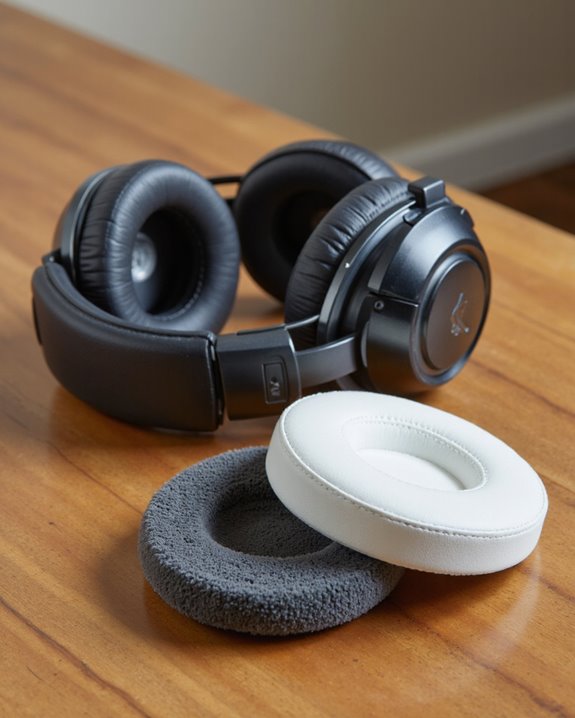As an Amazon Associate, we earn from qualifying purchases. Some links may be affiliate links at no extra cost to you. Although our opinions are based on curated research, we haven't used these products. Articles generated with AI.

Can I Wear Headphones After Wisdom Teeth Removal?
We shouldn’t wear headphones right after wisdom teeth removal—especially in the first 48 to 72 hours—since direct pressure from over-ear or on-ear models can disrupt healing, increase swelling, or dislodge blood clots leading to dry socket. Wireless headphones are generally a safer, lighter choice if we resume listening later, while wired models risk tugging the jaw or stitches. Limiting listening sessions and choosing soft music supports recovery. For detailed comparisons and specific timing recommendations, more insights await below.
Key Takeaways
- Avoid wearing headphones for at least 48–72 hours after wisdom teeth removal to prevent pressure on the surgical site.
- Wireless headphones are safer than wired ones, as they reduce the risk of tugging or pressure near the jaw.
- Bulky headphones can increase discomfort or swelling, so choose lightweight, cushioned models if you resume use.
- Limit listening sessions and keep volume low to minimize stress and allow your body to rest during recovery.
- Always consult your dentist or oral surgeon for personalized advice before resuming headphone use after surgery.
Physical Effects of Headphones on the Surgical Site
Although it might seem harmless to put on headphones after wisdom teeth removal, the physical interaction between headphones and the surgical site warrants careful consideration. During the recovery period, bulky headphones can exert direct pressure on the ears and jaw, which may transfer force to the surgical site. This pressure can lead to discomfort or even swelling, potentially disturbing healing tissues. If blood clots are dislodged, serious complications such as dry socket could result. Continuous contact from headphones, especially if worn for extended periods, further increases these risks. For ideal recovery, it’s generally advised to avoid any headphones immediately following surgery. Monitoring for discomfort is essential, as even mild irritation at the surgical site can impede healing and prolong the overall recovery period.
Differences Between Wireless and Wired Headphones
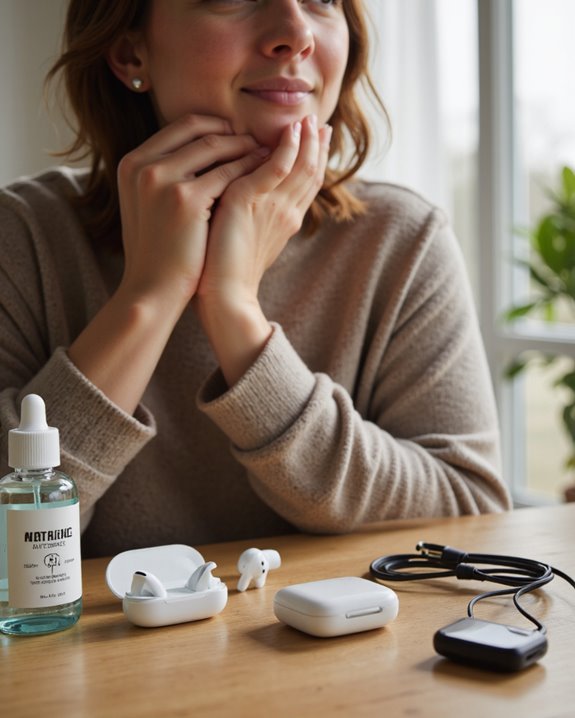
When considering headphones after wisdom teeth removal, it’s essential to understand the technical and practical differences between wireless and wired models. Wireless headphones, using Bluetooth technology, eliminate the risk of wires tugging at the surgical site—a key factor during post-operative recovery. They provide greater freedom of movement, reducing accidental pressure or irritation. Many wireless models are lighter, enhancing comfort and minimizing direct pressure on sensitive areas. In contrast, wired headphones introduce a physical cable, which can inadvertently pull on stitches or press against the jaw and cheeks, especially when reclining or adjusting position. This added pressure can compromise comfort and possibly interfere with healing. For ideal comfort and reduced risk of disturbance to the surgical site, wireless headphones generally offer a safer, more user-friendly solution during recovery. Additionally, wireless headphones often feature lightweight designs that further improve comfort during extended wear after surgery.
Tips for Listening to Music or Audiobooks During Recovery

With the advantages of wireless headphones in mind, let’s focus on enhancing your listening experience during the recovery period. To begin, always select soft music or calming audiobooks, as these auditory options help us relax and minimize stress, supporting healing. Keep headphone volume at or below 60 dB—roughly the volume of a normal conversation—to prevent unnecessary strain on the ears or irritation near the surgical site. Wireless headphones are ideal since they eliminate wire-related pressure or accidental tugging, which could disturb the stitches. If we use lightweight earbuds, make certain they don’t rest directly against the surgical site or create discomfort. Limiting individual sessions to 30–45 minutes allows us to enjoy auditory content while still prioritizing rest, a key factor in the overall recovery period. Consider using headphones with memory-protein foam earmuffs for added comfort during extended listening sessions.
Suitable Alternatives to Traditional Headphones
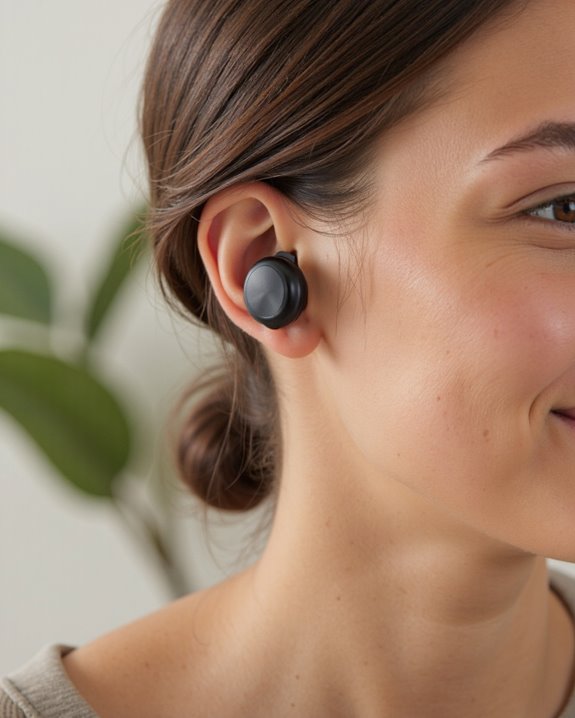
Selecting the right audio device during wisdom teeth recovery is critical to maintaining comfort and supporting the healing process, especially since traditional over-ear headphones can place unwanted pressure on sensitive areas. For those of us seeking alternatives, lightweight wireless earbuds or earphones are a practical solution. Unlike standard headphones, earbuds don’t rest against the jaw, thereby reducing the risk of irritation or disruption to the surgical site. It’s important, however, to verify that any earbuds we use are thoroughly cleaned before each use to minimize the risk of infection. Wireless models are preferable, as they eliminate the possibility of wires tugging at stitches. Additionally, keeping the volume low can help avoid ear strain and prevent inadvertent interference with our recovery. Choosing earbuds with IPX5 water resistance ensures protection against sweat and light moisture, adding to their suitability during recovery.
Recommended Timeline for Resuming Headphone Use

Most oral surgeons recommend that we hold off on using headphones for at least 48 to 72 hours following wisdom teeth removal, as this early phase is when the extraction site is most vulnerable to disruption and infection. During the first few days following surgery, avoiding headphones helps minimize any pressure on the surgical site, which can interfere with clot formation and healing. As our recovery time progresses, wireless headphones are preferable since they eliminate the risk of wires tugging on stitches or irritating sensitive tissue. Once we’re past the initial recovery window, we should consult our dentist or oral surgeon for guidance tailored to our specific case. It’s essential to monitor discomfort when resuming headphone use, making adjustments immediately if any irritation or soreness occurs.
Recognizing and Preventing Post-Surgical Complications
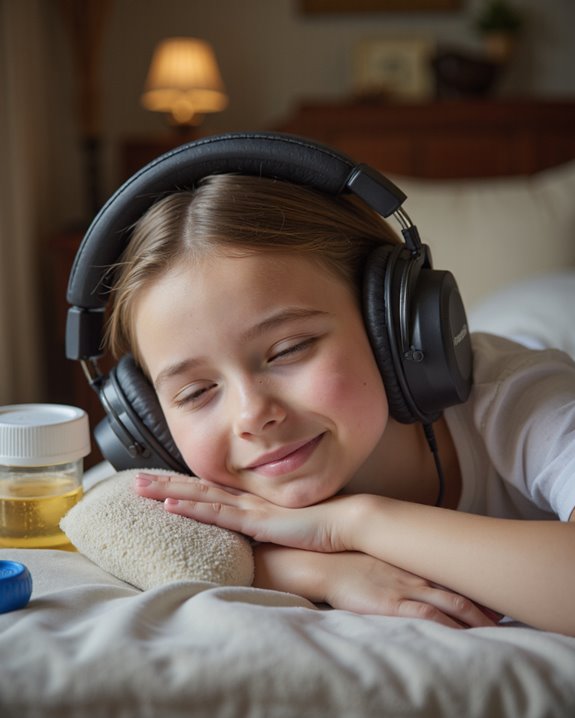
Although the temptation to resume normal activities quickly is understandable, recognizing and preventing post-surgical complications after wisdom teeth removal is critical for a smooth recovery—especially when considering the use of headphones. Applying pressure to the surgical area, even through bulky headphones, can disrupt healing and potentially dislodge the blood clot essential for recovery. We should opt for wireless headphones if we must use them, as they avoid wires that might tug on stitches and reduce physical contact. It’s important to monitor for pain, swelling, or bleeding—these may signal complications requiring prompt attention. Let’s always follow our dental provider’s guidelines on when to safely reintroduce headphones after surgery. If severe pain or excessive bleeding occurs, consulting our oral surgeon immediately minimizes the risk of further complications.
Essential Recovery Tips for Optimal Healing

When planning for ideal recovery after wisdom teeth removal, it’s essential that we implement strategies that minimize irritation and support tissue healing. Immediately following oral surgery, we should prioritize rest and a diet of soft foods—think yogurt, applesauce, or mashed potatoes—to avoid disrupting the surgical site. Taking prescribed pain medication as directed will help manage discomfort and reduce inflammation. It’s also important to keep your mouth clean; gentle rinsing with salt water after 24 hours supports healing and helps avoid complications such as infection. We should refrain from using headphones that exert pressure near the jaw and monitor for discomfort if any audio devices are used. Regularly reassessing our recovery process enables prompt response to any concerning symptoms, ensuring favorable outcomes.
Expert-Backed Resources and Further Reading

For those seeking authoritative guidance on headphone use after wisdom teeth removal, we’ve curated a selection of expert-backed resources designed to clarify best practices and address nuanced concerns.
Recommended Readings and Resources
- American Association of Oral and Maxillofacial Surgeons (AAOMS): Detailed post-operative care instructions, including minimizing pressure near the extraction site and monitoring for dry socket or prolonged bleeding.
- Journal of Oral Health and Dental Management: Research articles outlining the impact of external devices, such as headphones, on recovery and oral health following wisdom teeth removal.
- Harvard Health Publishing: Guidance on pain medication, infection prevention, and when to seek help if bleeding continues.
- Clinical Dentistry Podcasts: Interviews with oral surgeons on ideal recovery timelines and safe headphone use.
These resources offer technical depth while remaining accessible for practical decision-making.
Frequently Asked Questions
Can I Wear Headphones During Wisdom Tooth Removal?
When considering headphone comfort and sound sensitivity during wisdom tooth removal, we acknowledge patient preferences, but anesthesia effects and the need for communication make it best to use relaxation techniques or other distraction methods approved by your dental team.
What Are You Not Allowed to Do After Wisdom Teeth Removal?
After wisdom teeth removal, we shouldn’t ignore pain management tips, food restrictions, or oral hygiene. Let’s limit activities, use swelling remedies, and follow our dentist’s recovery timeline. These steps help us heal comfortably and avoid complications.
Can You Listen to Music During Wisdom Teeth Removal?
Let’s hit the right note—listening to music during dental procedures can be a great music distraction for anxiety management and patient comfort. If we’re under sedation, it’s best to ask the dentist for recovery tips first.
How Long After Wisdom Teeth Removal Can I Have Iced Coffee?
When considering iced coffee timing after wisdom teeth removal, we should usually wait 3–5 days. For ideal wisdom teeth healing, let’s focus on soothing beverages options and dental recovery tips, prioritizing pain management strategies before reintroducing post surgery caffeine.

